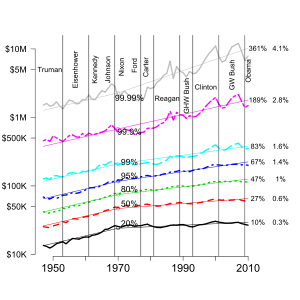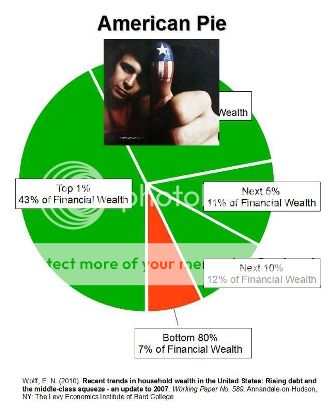The right wing conservatives and libertarians worship the rich and markets, it is these wonderful rich people and in these marvelous markets that jobs are created. To hear the wingnuts say it, you'd think jobs grew from the rich and markets were just brimming with work. Like money growing on trees the wingnuts bow to their gawds of money and magic. So here's a little history on jobs.
"More Government, Please!' By Thomas Frank, excerpted from the December 2011 Harper's magazine
Speaker Boehner giving a speech at the Reagan Building:
"One of the reasons job creators arent doing their thing, Boehner explained, is that they had been slammed by uncertainty from the constant threat of new taxes, out-of-control spending, and unnecessary regulation from a government thats always micromanaging, meddling, and manipulating. It was this last infractionexcessive regulation that drew most of Boehners ire, and as the Speaker spoke, the indictment lengthened. Not only were intrusion and micromanagement by Big Brother causing job creators to rend their garments in frustration.
[...]
This is such a shibboleth among Republican politicians that to hear it is to yawn, to move a few comfortable inches deeper into somnolence. But then the Speaker said something that caused me to shake my head and rub the sleep out of my eyes. The building in which he was talking, he pointed out, is named in memory of former president Ronald Reagan, who recognized that private-sector job creators are at the heart of our economy. And they always have been.
In point of fact, the Ronald Reagan Building is the opposite of a monument to free enterprise and private-sector job creation. The gigantic structure, completed in 1998, is the second-largest federal office building after the Pentagon. It was built under the supervision of the General Services Administration, on a scale so inflated that the former presidents son Michael once called it Mount Wastemore. Had this palaces existence been left entirely up to the private sector and the unfettered market, it would not be here. The jobs involved in its construction would not have been created at all."
[..]
"Here, if we are willing to see it, is a story that might prove instructive as we grapple with a second breakdown of our economic system. We can let people who are out of work languish on unemployment insurance, a program that didnt exist in the 1930s, or we can count on food stamps to see them through. But if we are so concerned about job creation, why not just create jobs? Its not an impossibility, despite the lessons intoned so soberly by Speaker Boehner and his colleagues."
Here come the jobs: Time Great Depression
"...The programs administrator, Roosevelt confidant Harry Hopkins, had famously spent more than $5 million in his first two hours as a federal official. At the CAW, he found jobs for 4 million people in two months.
Although it would be a brain stopping system error to acknowledge it nowadays, these achievements would probably make Harry Hopkins bleeding-heart, government- loving, unelected super bureaucrat Harry Hopkins the all-time greatest job creator in American history. Yes, his manic spending infuriated laissez faire purists of 1933 just as much as the Obama Administrations deficits bother such people today. But his tactics worked. The WPA, which Hopkins ran from 1935 to 1938, ultimately created about 3 million jobs per year.
[...] Even a thoughtful (so called) conservative agrees.
Compared to almost any tax cut, the employment impact of direct federal hiring is far superior, I was told by Ross Eisenbrey of the Economic Policy Institute. And as the economist Kevin Hassett, of the conservative American Enterprise Institute, assured a congressional panel in 2010, If the economic stimulus moneys were spent directly hiring individuals, they would have created twenty-one million jobs. Hassett went on to explain how federal money might be used to subsidize private-sector hiring."
Harper's Magazine
PS For the intelligent reader may I suggest checking into Harper's, for the wingnuts continue believing corporate created reality, corporations - so called job creators - love it when you all sing in tune.
"More Government, Please!' By Thomas Frank, excerpted from the December 2011 Harper's magazine
Speaker Boehner giving a speech at the Reagan Building:
"One of the reasons job creators arent doing their thing, Boehner explained, is that they had been slammed by uncertainty from the constant threat of new taxes, out-of-control spending, and unnecessary regulation from a government thats always micromanaging, meddling, and manipulating. It was this last infractionexcessive regulation that drew most of Boehners ire, and as the Speaker spoke, the indictment lengthened. Not only were intrusion and micromanagement by Big Brother causing job creators to rend their garments in frustration.
[...]
This is such a shibboleth among Republican politicians that to hear it is to yawn, to move a few comfortable inches deeper into somnolence. But then the Speaker said something that caused me to shake my head and rub the sleep out of my eyes. The building in which he was talking, he pointed out, is named in memory of former president Ronald Reagan, who recognized that private-sector job creators are at the heart of our economy. And they always have been.
In point of fact, the Ronald Reagan Building is the opposite of a monument to free enterprise and private-sector job creation. The gigantic structure, completed in 1998, is the second-largest federal office building after the Pentagon. It was built under the supervision of the General Services Administration, on a scale so inflated that the former presidents son Michael once called it Mount Wastemore. Had this palaces existence been left entirely up to the private sector and the unfettered market, it would not be here. The jobs involved in its construction would not have been created at all."
[..]
"Here, if we are willing to see it, is a story that might prove instructive as we grapple with a second breakdown of our economic system. We can let people who are out of work languish on unemployment insurance, a program that didnt exist in the 1930s, or we can count on food stamps to see them through. But if we are so concerned about job creation, why not just create jobs? Its not an impossibility, despite the lessons intoned so soberly by Speaker Boehner and his colleagues."
Here come the jobs: Time Great Depression
"...The programs administrator, Roosevelt confidant Harry Hopkins, had famously spent more than $5 million in his first two hours as a federal official. At the CAW, he found jobs for 4 million people in two months.
Although it would be a brain stopping system error to acknowledge it nowadays, these achievements would probably make Harry Hopkins bleeding-heart, government- loving, unelected super bureaucrat Harry Hopkins the all-time greatest job creator in American history. Yes, his manic spending infuriated laissez faire purists of 1933 just as much as the Obama Administrations deficits bother such people today. But his tactics worked. The WPA, which Hopkins ran from 1935 to 1938, ultimately created about 3 million jobs per year.
[...] Even a thoughtful (so called) conservative agrees.
Compared to almost any tax cut, the employment impact of direct federal hiring is far superior, I was told by Ross Eisenbrey of the Economic Policy Institute. And as the economist Kevin Hassett, of the conservative American Enterprise Institute, assured a congressional panel in 2010, If the economic stimulus moneys were spent directly hiring individuals, they would have created twenty-one million jobs. Hassett went on to explain how federal money might be used to subsidize private-sector hiring."
Harper's Magazine
PS For the intelligent reader may I suggest checking into Harper's, for the wingnuts continue believing corporate created reality, corporations - so called job creators - love it when you all sing in tune.

 Right on.
Right on. 


